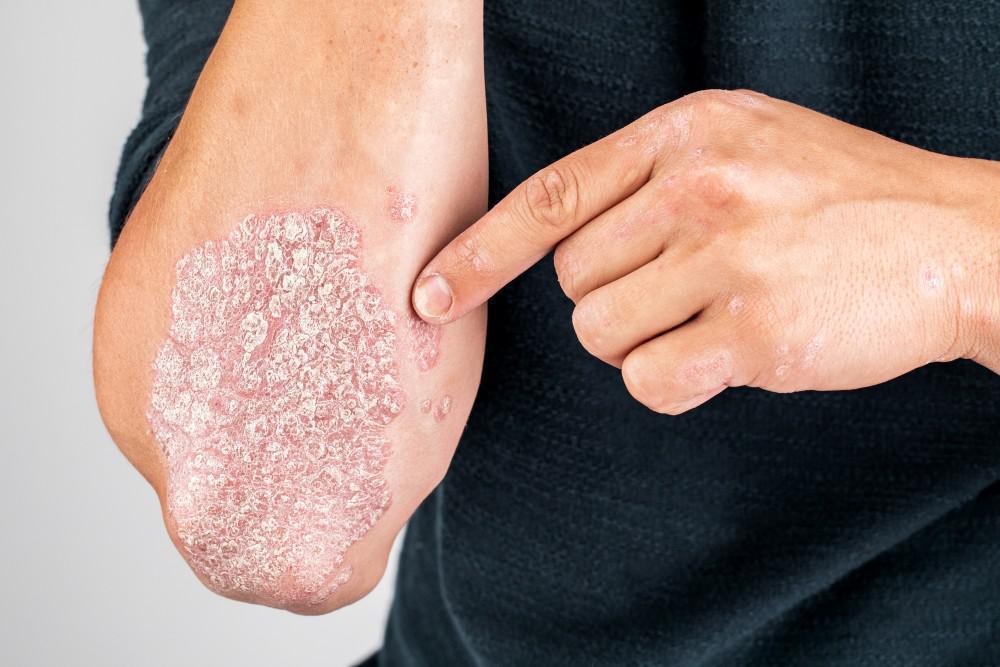Skin conditions like psoriasis often affect the trunk, knees, scalp and elbows. It causes a rash that has itchy, scaly patches. There is no known cure for the common, persistent illness of psoriasis. It may hurt, keep you up at night, and be challenging to focus on. The infection repeatedly goes through processes where it will flare up for a few months or weeks before decreasing. Infections, burns, cuts, and specific drugs are common psoriasis triggers in persons with a hereditary predisposition to the condition.
Plaques are the most common type of psoriasis. Dry, itchy, raised skin patches (plaques) covered in scales are a symptom of psoriasis. They could be few or numerous. They typically appear on the lower back, scalp, elbows, and knees. The following are psoriasis’s causes and triggers:
Causes of Psoriasis
Under the lowest layer of skin, your body regenerates new skin cells. Until they reach the outermost layer of skin, where they eventually die and flake off, these skin cells steadily advance through the layers of skin. Normally, the entire process takes three to four weeks.
Yet, this procedure only takes between 3 and 7 days in persons with psoriasis. As a result, immature cells quickly accumulate on the skin’s surface, resulting in dry, crusty regions that are covered in scales.
- Problems with the Immune System
Your immune system aids in the battle against infection and serves as your body’s defense against sickness. T-cells are one of the primary cell types utilized by the immune system. T-cells typically go throughout the body to look for and combat foreign microbes like bacteria. But in persons with psoriasis, they begin to unintentionally assault healthy skin cells.
This prompts the immune system to make more T-cells by causing the deepest layer of skin to produce new skin cells more quickly than usual. Although the precise aetiology of this immune system issue is unknown, some genes and environmental triggers might be involved.
- Genetics
If you have a close cousin who also has psoriasis, you may be more prone to develop it yourself; however, it is unclear what exactly heredity has to do with psoriasis. Many genes have been related to the onset of psoriasis, and different gene combinations can likely increase a person’s susceptibility to the disorder. However, having these genes does not guarantee that you will have psoriasis.
Triggers of Psoriasis
Many people’s psoriasis symptoms begin or worsen as a result of an occasion known as a trigger. Understanding your triggers may help you prevent an attack. Below mentioned are the triggers of the most common type of psoriasis:
- An injury to your skin, such as a scrape, insect bite, cut, or sunburn, can cause the koebner response, which is a common cause of psoriasis.
- Excessive alcohol use
- Smoking
- Changes in hormones, especially in women – such as those that occur between adolescence and the menopause
- Stress
- Certain medications, including lithium, anti-inflammatory drugs, some antimalarial drugs like ibuprofen, and ace inhibitors (used to treat high blood pressure)
- Throat infections – while the majority of people with streptococcal throat infections do not go on to develop psoriasis, in some people, primarily children and young adults, a kind of psoriasis known as guttate psoriasis does.
Final Words:
Hence, above mentioned are the causes and triggers of psoriasis. There is some Homeopathic Treatment for skin related issues, including psoriasis, which has proven to be the best solution to get rid of these health issues.





